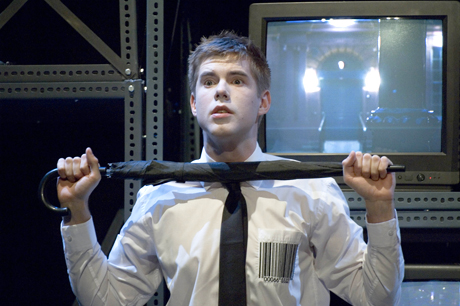Interview: director Paul Davies on A Clockwork Orange

"Horrorshow": A Clockwork Orange at the Arcola
Director Paul Davies insists that the production of A Clockwork Orange now playing at the Arcola Theatre in Dalston should not be looked at as a response to last summer’s riots.
But with its undertone of urban alienation and copious amounts of “ultra-violence”, Anthony Burgess’s linguistically inventive novella and the controversial Stanley Kubrick flick it spawned would seem relevant. Many people will recall Malcolm McDowell’s eyeballs bulging out of their sockets in the penitentiary scenes from that movie – scenes in which Alex, the story’s frightening protagonist, is forced to endure an onslaught of cinematic images in a bid to make him change his violent ways.
Davies’s play, staged by Welsh theatre company Volcano, is an adaptation that he says attempts to take its cue from both Burgess’s 1962 book and the stage script the author later penned. The film seems to be of lesser importance.
“Burgess was unhappy about the film because he felt it was too explicit,” says Davies. “Partly as consequence of the success of the film, many theatres made versions of the play or the book that were loosely based on the film. Burgess, as a consequence of this, wrote his own play script for the theatre … He turned it into a kind of musical in an attempt, I think, to shroud the sort of violence and the unrest of Alex.”
Davies admits that squeezing the dystopian world portrayed by Burgess down to just 75 minutes was a challenge. But says he felt compelled to have a go as previous productions “didn’t really do justice to the words”.
By this he means Nadsat, the horrorshow lingo used by Alex and his droogs (mates) and which Burgess, a super keen linguist, partly based on Russian.
“Burgess was a great wordsmith,” says Davies. “Part of the achievement of A Clockwork Orange is this incredible hybrid language. I was very keen on capturing that. Burgess was of the view that America and Russia were the two inevitable superpowers. But he also had this kind of Welsh influence. His wife was Welsh and she had a big influence on him.”
At the core of the text, says the director, is the question of whether it is better to be forced to do good or to be free to do evil. Burgess was, he says, pointing a finger at figures like the cultural critic FR Leavis and his view, apparently shared by other middle class academics of the time, that the underclass needed to be civilised and exposed to classical music and the likes of Beethoven, or, as Alex calls the composer, “lovely lovely Ludvig van”.
Davies says: “It’s so clever that Alex loves Beethoven, but he also kills someone accidentally and he rapes a couple of girls and basically enjoys beating people up. I think the text reminds us that if people are not having a good time, densely populated urban areas are going to go up. Burgess was thinking about it and writing it when there were riots in Russia and the teddy boy phenomenon and all that in the UK. Unless youth has got something gainful to do, especially in today’s climate, it’s going to engage in practices that the bourgeois class, and I include myself in that, are going to be slightly horrified by.”
So, there is a connection to the riots and the state of London today? “The sense of alienation in some parts of inner London is palpable,” Davies says. “The sense of unbelonging at every level … the sense of alienation from what it is to be alive there and then, from your own language, from your means to feed yourself, from camaraderie, from community…”
But there is hope in Burgess’s dark tale – something Davies says Kubrick’s film with its bleak Thamesmead settings failed to capture.
“Burgess wrote a redemptive chapter,” he says “which Kubrick didn’t include in the film. Alex comes out of prison, decides he’s had enough. He’s changing, etcetera, etcetera. He sort of decides that he wants to have a child. Burgess was a cultural conservative or sorts. He didn’t place a great deal of faith in modernity. I don’t know if this final chapter was his way of talking about the institution of the family and how that can be a good thing for people.”
The play, with its cast of five, has been somewhat unfavourably reviewed, but readers can decide for themselves until its run ends later this month.
A Clockwork Orange
Till Saturday 21 April
Arcola Theatre, Dalston
For tickets call 020 7503 1646.
